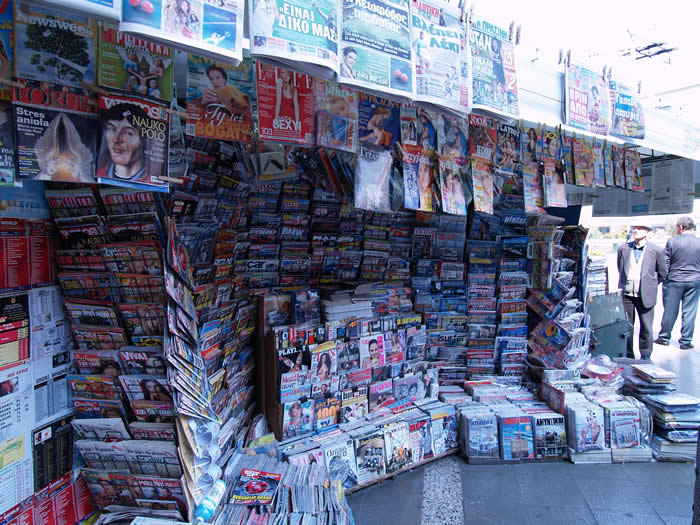More Bad News For Print Media
The news gets worse.
I’ve written several times here about the state of print media industry. From declining advertising revenues and subscription rates to the fact that Internet paywalls are not making up for the revenue that the industry has lost with the decline of print, it’s been a swift, sad, and in the case of the many newspaper employees who have been laid off or forced to take early retirement, it’s not pretty. Now, Business Insider’s Henry Blodget explains why things are only going to get worse for print media:
The shift to digital that has demolished some print publications is very much generational. And, from a generational perspective, this shift is only just beginning.
Media consumers in their 40s, 50s, 60s, and 70s grew up reading newspapers and magazines. Old habits die hard. Many of these consumers will never be as comfortable with digital as they are with paper, and they will keep reading newspapers and magazines until the day they die.
But media consumers in the 0s, 10s, 20s, and 30s have no such print habits or allegiances. To them, the idea of printing information on a dead tree and then trucking it to houses and newsstands seems ludicrous, old-fashioned, inconvenient, and wasteful. To these folks, paper-based publications are a pain to carry and search, easy to misplace, and hard to share, and the information in them is outdated the moment it appears. For those who weren’t raised on paper, digital is superior in almost every way.
This “digital generation,” moreover, isn’t just kids anymore. Slowly but surely, digital consumers are taking over the coveted media demographics. And in another 10 to 20 years, the only media consumers who still prefer print will be retired folks who have long since passed the torch of influence and spending-power to the digital generation.
(…)
In 10-20 years, these 16-34 year old consumers will make up the sweet spot of the consumer market. If this group were ever going to develop a love of print, we would likely have seen it by now. More likely, this generation of consumers will never care about newspapers and magazines the way they care about smartphones and computers.
As the generation of consumers who do care about print, meanwhile — the increasingly old people (like me) who grew up on print — continues to age, the pressure on traditional print publications will continue to increase.
None of this is entirely new, of course. The decline of print media has been well cataloged for the better part of a decade now. Nonetheless, Blodget brings home some very stark facts about the next generation of consumers that will drive the media market. For the most part, they have little or no allegiance to print media and they’re long past they age at which such an allegiance is likely to develop. The people who read newspapers and magazines are old, and they’re dying off. More importantly, they are quickly becoming part of a demographic group that advertisers aren’t nearly as interested in as they are people from roughly their late 20s through their mid 50s. Because of that, advertising revenues are likely to decline even further than they already have as advertisers refuse to pay for ad space that isn’t producing the kind of return they need or want. That, in turn, will accelerate the financial problems that newspapers and magazines at all levels of the market are already having. More institutions will close, or go online completely, and the era of the print newspaper will mostly come to an end.
There has been, and likely will continue to be, much lamenting about the business problems that the print media has had and the passing of many once great newspapers and magazines. However, the end of print media won’t mean the end of journalism, just its transformation into something different as it adapts to the online world. This is how economic progress and capitalism work. Nobody laments the candlemakers who saw their trade suffer with the invention of the electric light bulb, or the carriage drivers who lost jobs when the automobile was invented. It was a new era, and it was time for things to change. Personally, I haven’t read a print newspaper in more than seven years, and I’m happy not to worry about getting newsprint on my fingers just to find out what’s going on in the world.







I guess we are one of few who subscribe to two daily papers. I have older folks here who still like the daily newspaper.
I’m betting people in the 0s don’t really have an opinion on the matter one way or the other…
Former Journalist Shaun Mullen:
http://kikoshouse.blogspot.com/2014/05/rumors-of-newspaper-industrys-death-are.html
So demographically, newspaper readers are about the same as Republicans. Interesting.
Just think about how family habits and activities have changed in the last decades. It used to be breakfast toast, cereal, and coffee and read the morning paper. Then dad headed off to work and the kids went to school. Now it is run through the fast food drive through for a bacon-egg biscuit and high octane coffee or a frappe. The kids eat breakfast at school while they are supervised by teachers who had to get there before daylight to make sure that the kids don’t carry away the lunchroom; time that could have been spent planning their lessons, which they had to work on until midnight the night before (breakfast at school – there is a lesson there somewhere). So the whole structure and morning routine has changed and the newspaper is virtually ignored. The schools used to use newspapers in the classroom for reading, science, health, social studies, and math activities. That ended some time ago, probably about the same time schools started getting computer “labs”.
Ron brings up the most important point; print media is too expensive relative to digital, probably primarily because of ad revenue losses. Continually raising subscription rates cuts demand for those that aren’t that attached or comfort themselves with substitutes (though I haven’t found most newspaper websites to be sufficient for me).
My kids each have their own kindles and laptops, but still seem to prefer paper for books. My eldest attends a “tech” middle school, where most everything that is done is done on a computer, so I expect she likes the break to relax. Like some of us old people. What I’m getting at is that, I don’t think the younger generation thinks paper isn’t kewl any more, but print media isn’t.
He’s dead, Jim
@mantis: Republicans are actually hastening the demise of newspapers, FYI. Here in Seattle, the daily newspaper essentially ignores the 48% of us who lean moderate, conservative or libertarian. If consumers can’t rely on unbiased news, the advertisers get the message that the medium no longer IS. (apologies to Marshall McLuhan)
The media died quite some time ago. One of my friends, a UPI radio reporter, saw the handwriting on the wall and vamoosed. So did a lot of his colleagues.
It’s not news we’re getting any more; it’s infotainment.
Clearly we need Peabody and Sherman to get into the Wayback Machine, go back, and “un-invent” the internet.
And now, news is reduced to mere headlines. People share links on Facebook just from the headline, sometimes not even realizing that the “news” is parody. It makes one long for the 60-second detail offered by network news shows.
@Ron Beasley: You really took me back. Sunday morning color comic pages (that is how I learned to read, before 1st. grade). Later I would read every baseball game box score to check hits, hr. and k’s. I fed on every Mickey Mantle hit and home run, Whitey Ford shutouts, and Bobby Richardson hits. During the winter it was news of the Packers.
The web is great, but not the same.
As a late 30’s guy, I still get the Washington Post. It’s not too bad a deal. I enjoyed the WSJ online, but they really jacked up their rates. Internet is great, but there is still something nice about an actual newspaper
@Tyrell:
This is exactly right. Mornings have changed completely. Seems like schools and work starts earlier and earlier. Commutes are longer, etc. So there is little time to read the paper in the morning. Therefore, the demise of another institution: the paperboy.
I’m usually gone before the paper comes. The wife has to get to her school earlier to supervise kids who are dropped off before school.
I tend to read the digital edition more and more. Being older, I prefer the digital facsimile of the paper version rather than links.
So the question is this: where do people get their news and how comprehensive is it. In my own family, we don’t watch news on TV anymore. I rely on the local newspaper and the internet. My wife primarily relies on NPR on the back and forth to work. I worry about the kids. The oldest one out in the workforce seems to absorb his news from co-workers, the one in college from college roommates, and the youngest is just interested in sports. The atomization of sources of information, I afraid, will have more downside than upside.
I get almost all my news from ZITE. Its the best new app ever. Its very personalized too. Why read the newspapers when you can read news from all around the world?
Ann Arbor is a whore.
#SomeoneHadToSayIt
@Scott: Our source for tv news: Conkrite, Brinkley. Nothing today comes close.
@Scott: I get the Financial Times and read it on the train in to work. Am about the only one reading a subscrption newspaper however.
What’s different though is the mix of news one used to get from the papers. Traffic accidents on Interstate 5, double slaying in South Farmingham, Mayor and City Council squabble over transit tax, Teachers union defends local high school graduation rates, Army ponders closure of Fort Dilbert, European leaders meet amid Euro crisis, Latest trade figures, Joyce Thompson to wed Roger Rabbit, Intel introduces 1186 chip family at electronics show, Mary Worth, Dodgers complete sweep of Mets in nightcap, astrology, crossword puzzles…
That we aren’t getting from the internet. To be sure, I understand economic news much better today, with Paul Krugman and Brad DeLong and Don Beaudreau and Bryan Caplan to explain all the numbers to me. I;ve got a broader grasp of political news, maybe better perspectives on foreign affairs. I’ve got discussion of Windows 8 coming out of my ears, I see enough anthropology coverage each month to fill a textbook, there are websites that explain art so well I might be sitting in a gallery, etc etc etc.
All well and good. But I’m not getting accounts of the mayor and civy council arguing, because that’s too parochial for the websites I hit. I’m not picking up the stories about the local transit system cutting service because revenues are low, I’m not getting the “Smith marries Jones” stories unless Smith and Jones are the same sex, I don’t read about fires and traffic accidents and the local boy accepted into MIT out of 11th grade.
I sort of feel like a lesser person for not reading newspapers any more. I’m certainly a different person. And so are we all, and so will we be.
Two points.
1: Consider Kodak, if the discussion is to be the rise of digital and the demise of everything else. Hell, theyve torn down most of Kodak Park, and abandoned huge building investments made as recently as the 70’s. I know… I live there.
2: Consider also the state of the economy. Advertising sales are going down across the board.
One of the above, traditional papers might have a fighting chance with.
Both? No way.
@Eric Florack: Just a quick point about abandoning building investments–you do realize that in the seventies, you and I had either just started or were just finishing college, right? Yes, I realize that buildings last a long time but saying “they’re tearing down buildings that they build 40 or so years ago,” may not resonate as the end of an industry.